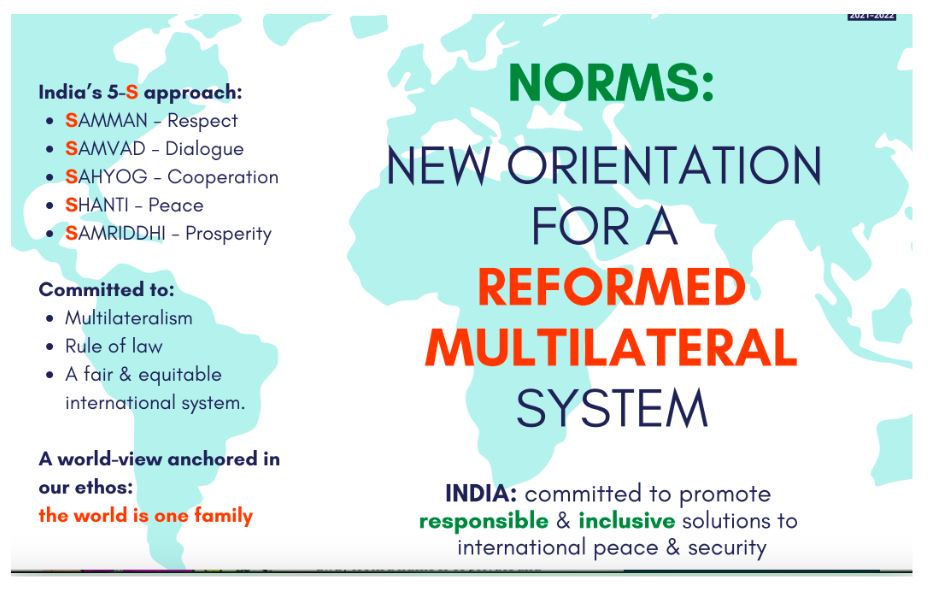UPSC Articles
INTERNATIONAL/ SECURITY
Topic: General Studies 2,3:
- Important International institutions, agencies and fora- their structure, mandate.
At the high table: On India’s U.N. Security Council win
Context: India was elected to the U.N. Security Council as a non-permanent member
Functions and Powers of UNSC
- To maintain international peace and security in accordance with the principles and purposes of the United Nations;
- To investigate any dispute or situation which might lead to international friction;
- To recommend methods of adjusting such disputes or the terms of settlement;
- To determine the existence of a threat to the peace or act of aggression and to recommend what action should be taken;
- To take military action against an aggressor;
- To call on Members to apply economic sanctions and other measures not involving the use of force to prevent or stop aggression;
- To recommend the admission of new Members;
- To exercise the trusteeship functions of the United Nations in “strategic areas”;
- To recommend to the General Assembly the appointment of the Secretary-General and, together with the Assembly, to elect the Judges of the International Court of Justice.
Composition of UNSC
- Five permanent members: China, France, Russian Federation, the United Kingdom, and the United States – who enjoy Veto power
- Ten non-permanent members elected by the General Assembly
- The non-permanent members are elected for two-year terms — so every year, the General Assembly elects five non-permanent members out of the total 10.
- Non-permanent member has to secure the votes of two-thirds of the members present and voting (secret ballot) at the General Assembly session — which is a minimum of 129 votes, if all 193 member states participate.
- These 10 seats are distributed among the regions of the world:
- Five seats for African and Asian countries; (3 are for Africa and 2 for Asia)
- One for Eastern European countries;
- Two for Latin American and Caribbean countries; and
- Two for Western European and Other Countries
- Also, there is an informal understanding between the Asia & Africa groups to reserve one seat for an Arab country. They take turns every two years to put up an Arab candidate.
What happened at the election that India won?
- India won 184 votes in the 193-strong UN General Assembly
- Ahead of the vote, India had launched a campaign brochure which highlighted
- Its demand for transparency in mandates for UN peacekeeping missions
- Push for the India-led Comprehensive Convention on International Terrorism
- Demand for joint efforts for UN reform and expansion of the Security Council
- India begins its term in the beginning of 2021, and will hold the position until the end of 2022.
Did You Know?
- In 2020, India was the only candidate for the vacancy from the Asia Pacific and was endorsed unanimously by the Asia Pacific group, which comprises 55 countries, including Pakistan and China.
- India has earlier been a non-permanent member of the Security Council in 1950-51, 1967-68, 1972-73, 1977-78, 1984-85, 1991-92 and 2011-12.
Significance of India’s win
- India’s Growing Credibility: Broad based support for India’s candidature means world places faith on India’s commitment to multilateralism and reforms.
- Diplomacy with agenda: A “new orientation for a reformed multilateral system” (NORMS), as laid out by India’s Minister of External Affairs, would be India’s overall objective during the two-year tenure
- Voice of developing countries: UN’s agenda has often been hijacked by the interests of five permanent members. India win means that it has got a platform to voice the issues of emerging countries.

Source: Ministry of External Affairs
Challenges Ahead
- Implementation hurdles: Achieving the objective laid out in NORMS, would depend on how India will conduct diplomacy in the global body, build alliances and raise issues that go beyond the interests of the big five
- Declining Multilateralism: The COVID-19 pandemic has already shaken up the global order and sharpened the rivalry between the U.S. and China. This has opened up fresh debates on strengthening multilateralism and multilateral institutions.
- Polarised world: India should avoid the temptation of taking sides at a time when the Security Council is getting more and more polarised, especially in the wake of US-China tensions
Conclusion
- To serve India’s interests and push for its agenda of multilateralism and reforms, India should adopt value-based positions that are not transactional











